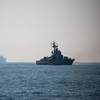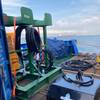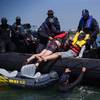From Canines to Liquefied Natural Gas
Maritime Security and the Coast Guard Authorization Act of 2008
For the past several years, maritime security has been on everyone's mind. From the halls of Congress to the longshoremen working the midnight shift, the threat of a possible terrorist attack on the maritime interests of the United States and dealing with new security requirements have kept this topic on the front burner. While most in the maritime industry are relatively aware of the legislation that has been promulgated since the terrorist attacks of September 11, 2001, new evolving legislation continues to be implemented. In this regard, the most recent legislation that addresses the continuing implementation of the maritime security regime is the Coast Guard Authorization Act of 2008, HR 2830 (the "Bill"). It is sort of a misnomer to state this is "recent" legislation since it has been bouncing around Congress for the last year or so, but nonetheless, maritime security continues to be a priority for most lawmakers. This article provides an overview of the security related provision of the Bill so that the regulated community can continue to monitor possible future requirements and programs to assist in their security related efforts.
The Bill was passed by the House of Representatives on April 24, 2008 by a vote of 395-7. In short, the Bill authorizes $8.4 billion for Coast Guard programs for the current fiscal year. With regard to security, the Bill contains several, twenty-four to be exact, provisions that deal with maritime security issues. The more important of these provisions will be discussed in more detail below. Specifically, the Bill, in part, expands the Coast Guard's canine team program, further implements the Transportation Worker Identification Credential ("TWIC") program, and provides logistical and jurisdictional guidance for the security of Liquefied Natural Gas ("LNG") facilities, both onshore and offshore. The Senate version of the Bill, S. 1892, was introduced in 2007 and was placed on the Senate legislative calendar for further action on February 5, 2008. S. 1892 does not contain any different security provisions of particular note.
It appears, however, that the Coast Guard Authorization Act of 2008 is going no where fast. As widely reported in the news media, President Bush threatened to veto the Bill based primarily on the provisions requiring the Coast Guard to take responsibility for security around LNG facilities, which the Administration asserts is a state and local responsibility. While the President has taken no definitive action on the Bill, given other political priorities, including the public and Congressional focus on the economy, the war in Iraq and the elections, it is unlikely that the Senate will be willing to take action on the Bill this year. Without Senate action, the work done by the House of Representatives will be lost for 2008. In any event, however, these security provisions will at a minimum be taken up again next year after the elections.
TITLE VII: PORT SECURITY
Section 702: Transportation Worker Identification Credential: The subject of Section 702 is one of the most relevant for maritime operations in the near future since it concerns the TWIC program, which has become the biggest sore spot with regard to security implementation. This Section would require that an assessment of the TWIC program be submitted by the Coast Guard to the House Committee on Homeland Security, and Senate Committees on Commerce, Science, and Transportation, and Homeland Security and Governmental Affairs. This report would, among other things, contain an assessment of the TWIC program after it is implemented at the ten ports designated a top priority by the Department of Homeland Security ("DHS").
In addition, DHS recently changed the final implementation date for the TWIC program. When the TWIC final rule was promulgated in January 2007, DHS allowed 20 months for all affected maritime workers to receive their TWIC. This time frame was established, in part, to allow for the opening of a sufficient number of TWIC enrollment centers to accommodate the need, which put the effective date at September 25, 2008. Given the extra time it has taken to establish a sufficient number of enrollment centers, there are currently approximately 100, the effective date has been extended to April 15, 2009. The implementation for shore-based facilities and Outer Continental Shelf ("OCS") facilities will continue to be on a rolling basis with a 90-day notice to coincide with the enrollment status in their particular Coast Guard Captain of the Port zone. However, it appears that the April 15 date will be the final implementation date upon which all mariners must obtain a TWIC and owners and operators of vessels, facilities and OCS facilities must implement access control procedures utilizing TWIC. Interested parties should continue to monitor the Federal Register as to the exact rollout dates for each port.
Section 705: Maritime Security Response Teams: Section 705 would require that no less than two maritime security response teams be established to act as the Coast Guard's rapidly deployable counterterrorism and law enforcement response units. The goal of these teams would be to apply advanced interdiction skills in response to threats of maritime terrorism in a timely manner and in coordination with other federal, state, and local law enforcement and emergency response agencies.
Section 706: Coast Guard Detection Canine Team Program Expansion: Section 706 would require that, no later than 240 days following enactment of the Bill, the Coast Guard would begin to increase the number of detection canine teams for the purpose of maritime security. In particular, the number of teams would be increased by no fewer than ten teams annually through 2012. Additionally, this Section would encourage owners and operators of port facilities, passenger ships, ocean-going cargo vessels, and other vessels to utilize canine teams. These teams would be deployed to ports based on risk, consistent with the Security and Accountability for Every Port Act of 2006.
Section 707: Coast Guard Port Assistance Program: Section 707 is intended to assist owners and operators of foreign ports in bringing their particular port into compliance with the International Ship and Port Facility ("ISPS") Code. In particular, DHS would lend, donate or otherwise provide equipment, and provide technical training and support based on the risks to the security of the United States, the inability of the port or facility to come into and remain in compliance with the ISPS Code standards and the precondition that the port or facility has been subjected to a comprehensive port security assessment by the Coast Guard.
Section 709: Review of Potential Threats: Section 709 would require DHS to submit a report to the House Committee on Homeland Security and the Senate Committee on Commerce, Science, and Transportation analyzing the threat, vulnerability, and consequence of a terrorist attack on the gasoline and chemical cargo shipments in port areas of the United States not later than one year from enactment of the Bill.
Section 710: Port Security Pilot: Section 710 would establish a pilot program to test and deploy preventive radiological or nuclear detection equipment on Coast Guard vessels and other locations in select port regions to enhance border security.
Section 711: Advance Notice of Port Arrival of Significant or Fatal Incidents Involving U.S. Persons: Section 711 would require owners and operators of cruise ships that embark and disembark passengers in the United States to notify the Coast Guard of any covered security incident that occurs on the cruise ship in which a U.S. person is involved in conjunction with its advance notice of arrival requirements. A covered security incident includes any criminal act or omission that results in death or bodily injury, all sexual assaults and missing persons, or any other incident that poses a significant threat to the cruise ship, any cruise ship passenger, any port facility, or any person in or near the port. This information will be maintained on a publicly available internet database and where the cruise lines will be identified by name along with the alleged crime. Additionally, cruise lines will be required to have a link from their own websites to this database.
Section 714: Comparative Risk Assessment of Vessel-Based and Facility-Based LNG Regasification Processes: Section 714 would require that a study be conducted within 90 days of passage of the Bill comparing the safety and security risks associated with vessel-based and facility-based LNG regasification processes conducted within three nautical miles from land versus such processes conducted more than three nautical miles from land. This study would need to be completed and presented to the House Committees on Homeland Security, Transportation and Infrastructure, and Energy and Commerce and the Senate Committees on Homeland Security and Governmental Affairs and Commerce, Science, and Transportation within a year of the enactment of the Bill.
Section 719: Seamen's Shoreside Access: Section 719 would require each facility security plan to provide a system for seamen to board and depart vessels at a facility in a timely manner at no cost to the individual.
Section 720: Waterside Security around LNG Terminals and LNG Tankers: Section 720 would require enforcement, by the Coast Guard, of any security zone established by the Coast Guard around an LNG tanker, offshore or within navigable waters. In the event multiple security zones are established, the Coast Guard would be required to make a decision to allocate adequate resources to deter a Transportation Security Incident ("TSI"), to the maximum extent practicable. A TSI is defined as a security incident resulting in a significant loss of life, environmental damage, transportation system disruption, or economic disruption in a particular area. In order to carry out these enforcement activities, the Bill would permit limited reliance on state and local governments as long as the state or local government enters into a contract, cooperative agreement, or other arrangement with the terminal operator to provide such services. This is the specific provision of the Bill that is the source of the Administration's threatened veto.
Section 721: Review of LNG Facilities: Section 721 would require DHS to notify the Federal Energy Regulatory Commission ("FERC") when a determination is made that the waterway to a proposed land-based facility is suitable or unsuitable for the maritime traffic associated with such a facility. Within 90 days of such notice of determination, FERC would have to notify DHS of what action it intends to take regarding a proposal to construct and operate an LNG terminal.
Section 723: Report on State and Local Law Enforcement Augmentation of Coast Guard Resources with Respect to Security Zones and U.S. Ports
Section 723 would require a report, within 180 days of the enactment of the Bill, to the House Committees on Homeland Security, Transportation and Infrastructure, and Energy and Commerce and the Senate Committees on Homeland Security and Governmental Affairs and Commerce, Science, and Transportation regarding the state and local law enforcement augmentation of certain Coast Guard resources. Specifically, the report would have to address the extent to which state and local law enforcement resources are augmenting Coast Guard resources that are being used to enforce security zones around vessels transiting to, through, or from a United States port or conducting port security patrols.
Even though it appears unlikely that new security legislation will be enacted in 2008, given that over 95% of the U.S. international trade is transported by water, maritime security issues will continue to be a priority for Congress and the public at a minimum by next year. Owners and operators of vessels and other interested stakeholders must continue to be ever-vigilant in monitoring and implementing evolving security requirements as they are rolled out. Thus, this article is intended to meet that goal.
(Reprinted from the August 2008 edition of Maritime Reporter & Engineering News)












